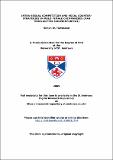Intra-sexual competition and vocal counter-strategies in wild female chimpanzees (Pan troglodytes schweinfurthii)
Abstract
A growing body of behavioural data is beginning to show that, like their male counterparts,
female chimpanzees can be competitive and aggressive, particularly when resources come
under pressure. These observations are especially surprising because, for a long time, females
were simply considered passive pawns of male social manoeuvrings. While we are beginning
to understand the complexities surrounding female chimpanzee group living, exactly how
females manage these social pressures is unclear. In this thesis I address this by focusing on
female competition in wild chimpanzees and the importance of vocal counter-strategies.
I examined two commonly produced female vocalisations: copulation calls and victim
screams from chimpanzees (Pan troglodytes schweinfurthii) in the Budongo Forest, Uganda.
My results regarding the production and acoustic structure of copulation calls suggests that
these vocalisations play a crucial role in the lives of female chimpanzees, dissipating the risks
associated with female competition.
During aggression, chimpanzee females commonly produce victim screams and these calls
have been shown to vary systematically with the severity of aggression experienced. A
playback experiment showed that victim screams are meaningful to females and that listeners
do not just respond to the acoustically most salient signals in their environment. Females may
use this information to keep track of out-of-sight agonistic interactions and make appropriate
social decisions regarding whether to avoid an ensuing attack.
Taken together, I propose that vocalisations may represent important behavioural counter-strategies, enabling females to navigate successfully through their socially intricate world.
Type
Thesis, PhD Doctor of Philosophy
Collections
Items in the St Andrews Research Repository are protected by copyright, with all rights reserved, unless otherwise indicated.

